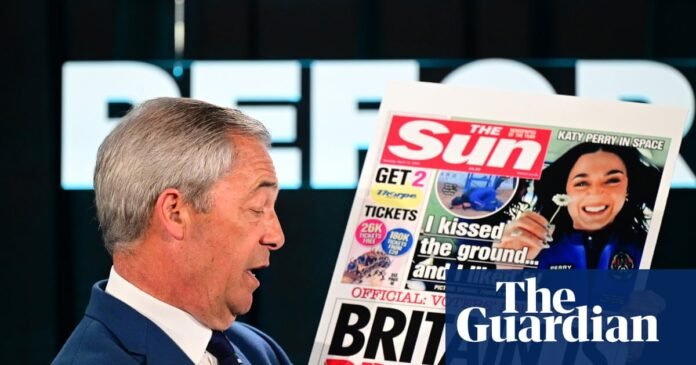As the 2015 election hove into view, one of Nigel Farage’s team was frustrated. Ukip, the party Farage then led, had recently caused what was widely regarded as a political earthquake by winning the European parliament elections.
The Daily Mail seemed to agree with everything Farage was saying, most notably his condemnation of the number of Romanians and Bulgarians coming to Britain. Why then, Farage’s adviser asked a senior Daily Mail journalist, would the paper not endorse Ukip?
With a nod to the paper’s seemingly unshakeable bond with the Conservative party, the journalist replied: “Orders, dear boy, orders.”
A decade on, Farage is once again leading in the polls, this time as head of Reform UK. There is no such frustration within his team, however. Recent media coverage has insiders believing those old bonds tying the traditionally Conservative-supporting press to their favoured party are weakening.
In the past week, the Mail published a striking front page headline: “Britain is facing societal collapse, warns Farage.” It was accompanied by a leading article generally supportive of a speech he had made on crime. The previous day, the paper had run an article by Farage arguing that Britain “needs Reform”.
Meanwhile, a beaming Farage could be spotted on social media holding up a double-page spread from the Sun on Sunday. It showed another of his articles on the same page as the headline: “Lawless UK.” On Monday, the Telegraph’s front page led with the Reform leader’s promise to build more prisons.
In both Reform and Conservative circles such coverage is being watched closely. All believe it is being driven by Reform’s now consistent poll lead. “Things are progressing quite nicely,” said a senior Reform source. Another said: “We have demonstrated to editors that we aren’t going away.”
While this week marked a spate of glowing Reform coverage, a party insider said more important breakthroughs came in the spring. In April, the Sun ran the front page headline “Britain is broken” – Reform’s local elections slogan. “That made Westminster sit up and take notice,” the Reform staffer said.
In May, Farage’s team was delighted when the Mail published his essay setting out the agenda for a future Reform government.
The critical moments may have come even earlier, however. Farage’s team is said to have held a series of meetings with senior figures from centre-right papers at the turn of the year. The talks were designed as a post-election reset. The Mail titles had backed the Tories and suspicion of them within Reform was significant. “We’ve broken bread since then, of course, and things have got a lot better,” said one Reform figure.
More recently, Farage attended a summer party held by News UK, owner of the Times, Sunday Times and the Sun. Tim Shipman, the former chief political commentator for the Sunday Times, disclosed this week that Farage had dined with Victoria Newton, the Sun’s editor.
after newsletter promotion
Others believe that the positive coverage is simply part of a wider radicalisation on the British right, towards harder lines on immigration, culture and crime that would once have been considered way beyond the mainstream. “What we used to call the Tory press is not the Tory press any more,” said David Yelland, a former editor of the Sun. “They’re embarrassed by the Conservative party. The agreed consensus of the Tory press has shifted right.”
Some Conservatives fear their party has been complicit in improving Farage’s standing with some papers, alleging a lack of activity by the Tory leader, Kemi Badenoch. One former Conservative staffer blamed her for putting the party into “cold storage” after the election, cutting off a brief poll rise it enjoyed last autumn.
“Fundamentally, [media outlets on the right] obviously are going to be anti-Labour,” they said. “There’s so little coming out of the Tories that they just don’t really have that much of a choice but to go with Reform stuff. It comes down to effort. They really want it.”
Other Conservative critics blame Badenoch’s poor relationship with reporters and editors. Some said she had been known to bypass newsrooms altogether and complain to media company executives when she disliked a story.
These criticisms are strongly rejected by Badenoch’s team, which says the party consistently secures front pages with its media strategy.
Yet when it comes to the crunch, will any major newspaper groups back Reform at the next election? Such decisions are taken late in the day by editors and owners, but the Conservatives fear much damage could be done by then.
As a member of Rishi Sunak’s team pointed out to Telegraph journalists after it endorsed him before last year’s election: “You’ve been kicking the shit out of us and giving these guys oxygen for the past 18 months. This is all a little bit late in the day.”
Yelland said papers risked “boxing themselves in” by fanning Reform’s flames now. “Editors will have to back Farage or be forced to pull off ‘a Washington Post’ and endorse nobody at all,” he said.
One senior Conservative HQ source said a closer look at some of Farage’s policies, such as nationalising some of the water industry, should raise obvious questions for the Telegraph and Mail. “His policies are not conservative,” they said. “That’s tricky for them.”
Ultimately, several Reform and Conservative figures said it would come down to whether Reform’s poll lead endured. “I really cannot see anything changing,” said Gawain Towler, Reform’s former head of press. “If that’s the case, everybody wants to back a winner. The Tories are not a winner.”
For now, senior figures inside the Mail and Telegraph do not believe that the odd glowing front page will translate into election support for Reform. However, Yelland said election endorsements were beside the point. “It’s the day-to-day coverage that matters,” he said. “And there’s no doubt that despite the fall in circulation, the Mail in particular influences broadcast media in this country immensely.”






